Ellis Nelson's Blog
September 25, 2025
Is ICE Coming to Your Town?
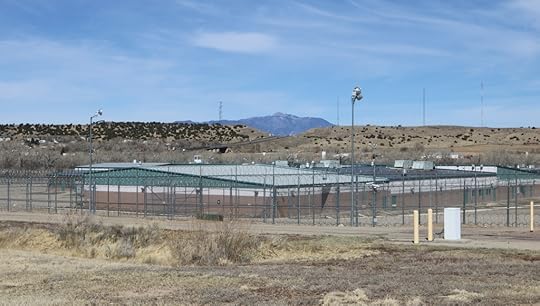
In mid-August the Washington Post broke an important story about Stephen Miller ramping up his mass deportation scheme. All over the country, ICE is eyeing defunct prisons and slowly re-opening some of them. Some communities have tried to fight these re-openings. Some see dollar signs and roll-over, often thinking they have no grounds to stop the feds making contracts with private companies like GEO and Core-Civic.
ICE’s new plan will double detention capacity to over 100,000 people and spread detention centers into new areas of the country. Fueled by the $45 Billion from the Big Beautiful Bill, ICE will hire 10,000 new employees and expand existing and soft-sided detention centers (like Alligator Alcatraz). Of special note is the impending growth in family detention facilities that the administration has said is its preferred method of deporting families. Apparently, we should expect to see a lot more of this in 2026 and onward.
In Colorado, ICE seems to be planning to open up to three new sites: Walsenburg, Hudson, and Ignacio. Reporting from Walsenburg indicates that their mayor is all in for ICE to come to town. He expects an economic boom. The problem is that there’s a body of research that suggests that prisons don’t actually lead to economic growth. The research indicates that employment growth doesn’t happen. Towns with prisons have lower retail sales, lower wages, and slower housing growth compared to towns without prisons. Property values decline near the prison with a shift to lower income households. Any jobs the prison might bring in generally go to senior people already in the system (or company). People in these small rural towns where ICE wants to re-open a defunct prison often don’t have the skillsets required to be hired. One study showed that prison employees commuted twice as far as other workers indicating prison workers often don’t reside in the communities where the prison is located.
And those wonderful economic benefits that are sure to flow back into a community with a prison? They just don’t materialize. A prison (or ICE detention facility) operates as a unique business model, a self-sustaining entity that takes care of its own food, laundry, maintenance, security, transportation, etc. It doesn’t link into the community to buy things or stimulate local businesses the way any other kind of operation might. In addition, prison or detainee labor can compete and crowd out local competition for services in the community.
And then there are the costs that local taxpayers would be required to bear to have the “privilege” of being stigmatized with having a morally repugnant entity in town. It’s a shame that so many towns have already had ICE reactivate these centers. More are scheduled to open unless something changes and changes fast.
For more:
https://www.youtube.com/watch?v=2miN1ltrOUc&t=18s
ICE documents reveal plans to double immigrant detention space by 2026 – The Washington Post Washington Post, 15 Aug 2025, “ICE Documents Reveal Plans to Double Immigration Detention Space by 2026” by Douglas MacMillan , N. Kirkpatrick, and Lydia Sidhom
August 14, 2025
Reaching Down the Rabbit Hole:
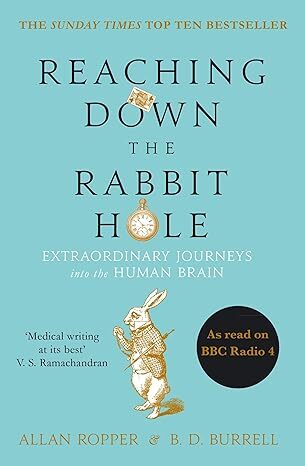
A Renowned Neurologist Explains the Mystery and Drama of Brain Disease
By Allan H. Ropper, Brian David Burrell
This is a fascinating book of stories by a neurologist covering some of his most interesting cases and patients. Written by a caring and professional doctor, the reader encounters everyday people who present with a variety of bizarre symptoms. In a teaching hospital setting, a neurologist and his staff step through the process of diagnosis and treatment for a variety of conditions. All the stories are compelling. Some of them are difficult because people’s lives and survival are at stake. Dr. Ropper also discusses treating Michael J. Fox for Parkinson’s in the early days of his diagnosis.
Probably the most controversial chapter in the whole book comes toward the end when Ropper bravely takes on the question, “When is somebody not dead yet?” Neurology is a field that can present a tangle of ethical and moral dilemmas. None more controversial it turns out than when defining when someone is actually dead. Ropper discusses how the need for a scientific definition of death became paramount when organ harvesting became possible. Conveniently, medical imaging of the brain and organ transplants came online side by side. Doctors could reasonably assess the likelihood that a brain would not recover. They called that brain death. Troubling though was that the body remained…alive. And bodies that donate organs remain alive, which can be morally problematic for some doctors. Imagine that. It bothers me too. Mostly, because I look at death not as an event but as a process. So choosing a moment of death has always sounded like pure hubris to me. Anyway, I was surprised that a doctor would cover this question and have hangups. Some of his colleagues clearly hadn’t thought about it at all.
If you’re interested in medical writing that has been compared to Rouche, Lewis Thomas, and Oliver Sacks, this may be your next great read.
To find my books: click below
BOOKS
July 24, 2025
One Million Rising
One Million Rising: Session 1
Please devote 90 minutes to this important training session to understand how authoritarianism works and view a plan to counter it together.
So many have asked, “What can I do?” Here’s the answer!
From the YouTube Channel:
“Join us for the first One Million Rising coordinating call and training! Get oriented to making meaning of this moment and the role you can play in coordinated strategic action. This 3-part training will equip you with a coordinated national strategy to organize locally, host community gatherings, and build a force bigger than fear. Sign up, show up, and take action together. Access your Community Resistance Gathering Host Toolkit here – it has everything you’ll need to host a gathering!” https://docs.google.com/document/d/18… Make sure you’re signed up for our last two sessions in the One Million Rising series – we’ll cover everything else you need to know then! https://www.mobilize.us/nokings/event… Take the pledge to host a community resistance gathering! https://www.nokings.org/rise
July 15, 2025
STAND UP! BE SEEN!

I spend a fair amount of time on social media and since the election, people have been asking, ‘what can we do?’ A lot of us acknowledge just how deeply we are into totalitarian rule and the undercurrents that flow on the socials often combine bewilderment with despair. In fact, if you aren’t feeling that from time to time, I’m wondering about you as a person.
To the extent that I can, I try to remind people to show up for the protests. Those non-violent protests where 3.5 percent of the population take to the streets ALWAYS leads to change.* But I always add— eventually. I recommend joining the ACLU and doing all their email campaigns. They make it easy, and they have had major wins. But what else???
Well, here’s the pitch— I want you to imagine a different world. One that takes courage. One where you put yourself on the line. One where you’re willing to stand out and stand up. Ready??
I’m asking you to fly the RESIST flag at your house. Why? Why will this make a difference?






Because we need to take the fight against fascism into every neighborhood in America. We need to empower all those sleepy individuals who up until now knew that what they were seeing was wrong but felt too alone or too scared to speak up. We must be that first wave to act to empower others. To do the next right thing. As we look out across America, the real patriots are the resistors, not the false flyers of American flags who hide behind a history that never existed. Can you also fly the American flag? Yes! But only if you pair it with the resistance flag or banner.
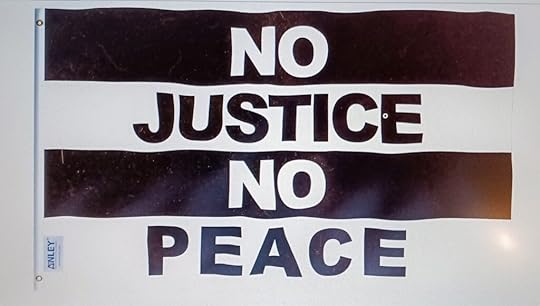
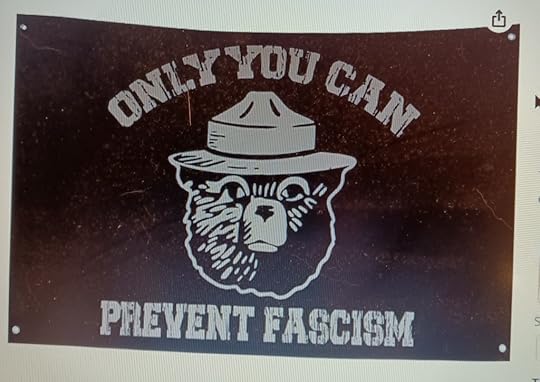

Imagine that world where all of us stand together. Imagine a world where we push back against totalitarian rule and all its trampling of American freedoms. You want to know what you can do today? Get your flag up! Become a role model for your community. Be the change.
Character cannot be developed in ease and quiet. Only through experience of trial and suffering can the soul be strengthened, ambition inspired, and success achieved.
Helen Keller
June 25, 2025
Musings of a Medieval Abbess:
Book I of the Cumbrian Chronicles

By Linda Marie Brown
Have you ever wondered what life in a medieval monastery or convent was like? This is a book that goes a long way into giving insight into that experience. Musings of a Medieval Abbess is written in diary form by the fictional character known as Isentrude, an Augustinian nun. She lives in the northernmost parts of England during the time of the War of the Roses (mid-1400s). The book is pastoral, following the ebb and flow of the seasons and the goings on at the abbey. It’s a fairly quiet and reflective book offering a respite from our own highly fraught time.
It’s difficult to tell how accurate the book is to the period because Isentrude often has remarkable insights about her station in life, the Church, and the politics of the time. Indeed, her journal would be regarded heretical, if ever discovered—so she keeps it hidden. As Abbess, she is in a unique position of running an abbey but having no real peers. Her only confidante is a younger nun who she took under her wing decades prior. They often function as a team taking on challenges together as the years go by.
One of the most interesting parts of the book concerns how much freedom women had in during the era. Most of the nuns Isentrude leads do not have any religious calling but end up in the abbey as a kind of last resort. Trying to lead a group of women with different backgrounds, motivations, and talents during trying times constantly tests Isentrude. Because the Augustinian Order is a teaching and healing order, the abbey runs an orphanage, copies manuscripts, and tries to minister to the local community all while trying to be self-sufficient.
Also portrayed in the book are some of the tumultuous secular politics and shifting allegiances during the War of the Roses. The Abbey tries to stay neutral while knowing certain power players could dissolve their religious institution. Church politics are also something Isentrude learns to negotiate in her years being Abbess. Running an institution of women in a man’s world requires a set of skillfully acquired tools.
If you like medieval, historical fiction especially that explores the lives of women in the Church, this may be for you.
To find any of my books: click the BOOKS box below
Down the Treacle Well
Timeless Tulips, Dark Diamonds- A Ghost Story
Into the Land of Snows
Elephants Never Forgotten
BOOKS
June 22, 2025
Summer Sale: $.99 Kindle Deal
(now through June 25th only!)

Multiple 5-Star Reviews!
While visiting a museum in England, Ben and Kyle experience the extraordinary. Gazing at the Alfred Jewel, an ancient Anglo-Saxon artifact, they watch as it spins, contorts, and evaporates from its case, taking them with it.
Whisked back to Victorian England, the brothers are shocked to find themselves sprawled on the floor before Mr. Charles Dodgson, also known as Lewis Carroll, the author of Alice in Wonderland.
They soon learn that the famous author’s muse, Alice, is missing. Alice has used the Alfred Jewel to enter Wonderland and, by so doing, has upset the time continuum. The only way for the boys to return home is to locate Alice and return her safely.
But Wonderland is a strange and dangerous place…
Grab your Kindle version Now through June 25th!
June 8, 2025
NO KINGS DAY Protest: June 14, 2025

In light of what’s going on in LA and everything else, we need everyone on the streets for this march. Find your local march (by zip code) at https://www.nokings.org
Check out the downloadable artwork under Art then Posters.
BTW- Everyone needs to watch the use of language in media/government sources now. Especially, note if “riot” replaces “protest”. It is a common ploy by fascism to weaponize language to escalate tensions and then call for “law and order”.

They also have great resources like trainings here:
https://www.nokings.org/trainings
Safety & De-escalation: June 8th, 4PM Zoom
Disappeared in America: June 9, 8PM Zoom
Remember self-care as we carry on this fight!
May 23, 2025
Good Trouble
Registration is required for the June 14th military parade in DC. Maximum of 2 tickets per cellphone # (you will be required to verify the phone # with a code they send). Easy process, it took me less than 2 minutes. It would be interesting to know what happens, if say people in large numbers requested tickets and then didn’t show up. His orange majesty might rage- or huff and puff….
May 15, 2025
How Fascism Works
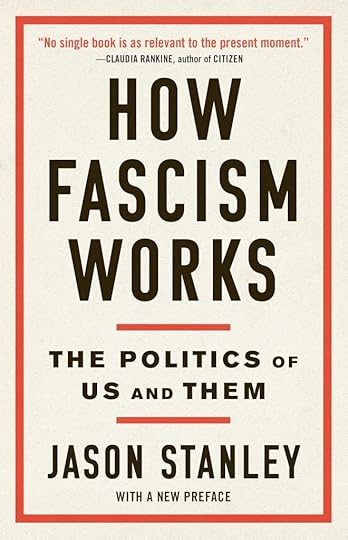
By Jason Stanley
Most of us are struggling to understand what is going on in the country. A country that seems to have gone off-rail and is headed for disaster. This is the go-to book to start to understand the history and current dynamics at work behind it all. Best of all, Stanley’s book is easily readable and short. It also seems to be on sale on Amazon. Because it’s a bestseller, you can probably get a copy at your library as well. Grab it, it’s your sanity blanket as we navigate these turbulent times. It has been said that no other single book is more relevant to this moment in history.
Stanley used to teach at Yale but has recently relocated to Canada because of the current political situation. You’ll have a deeper understanding of how universities, who are on the frontlines of free speech always become targets under fascism, once you read his chapter on anti-intellectualism. Stanley also brings his unique perspective of being the child of WWII refugees who fled Europe to come to the US and begin a new life.

Photo by Paul Sableman
How Fascism Works contains ten chapters outlining the structure of fascist politics, how they become established, complete with historical examples including those from Poland, Hungary, Myanmar, India, and (sadly) the US. Stanley explores the powerful tactics used by a fascist regime that if not checked successfully can ultimately lead to authoritarianism. These tactics involve many policies including:
Fracturing a society into believing there’s an “US” versus a “Them,” which can be based on color, religion, or culture.
Creating a mythic past about the nation, steeped in nostalgia, intangible, and not based on reality. A place where patriarchy was strong and unthreatened.
Using propaganda to deliberately pervert meaning. Masking corruption under the guise of anti-corruption is a hallmark strategy. Ultimately, the twisting of democratic language through propaganda is aimed at dismantling the “rule of law” and replacing it with authoritarian rule. Propaganda elevates the irrational over the rational, emotion over intellect. Fascists reject Enlightenment ideals because they conflict with “natural law.”
Crafting a society that is anti-intellectual. Universities and experts are attacked and debased. Education is remade to support the mythic past where only that viewpoint is tolerated. Certain areas of study are suspect or eliminated (especially gender studies, African American studies, Middle Eastern studies, Women’s studies, etc.). In the US, fascist policy attacked government, science, academia, and the media. Fascism dumbs down the message and loves repeating slogans.
Building a state of unreality in which truth is in constant doubt. Fascism attacks information spaces that allow lively debate. Lying without consequence destabilizes causing a sense of loss and mistrust. Conspiracy theories target an outside group to benefit an in-group. Trusted media sources are questioned or vilified. These techniques stoke fear and allow the regime to curb freedoms with support from the populace. In Fascist politics, speech isn’t about truth it’s about stirring emotion. Truth is not necessary. In this world of unreality, news becomes sport, tribal identification extreme, and the strongman becomes the star.
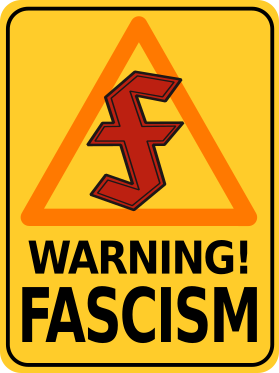
Photo by Jvrijman
Supplanting democracy’s fundamental principle of equality with hierarchy. Hierarchy is the idea that a given society is at the top with regard to power and dominance and that this is a consequence of nature. The idea is inconsistent with everyone being equal or having human dignity. When a society faces outside pressure or is in decline, and its loss of exceptionalism is possible, liberal democracy frequently falls prey to fascist attacks. Fascist forces flourish in a fearful, uncertain society.
Cultivating victimhood. Fascism exploits feelings of victimization by a dominant group when a subordinate group achieves or tries to achieve a sharing of power. In the US, there has been a popularization of the fact that by 2050 the racial makeup of the country will be very different. This has been done purposely by certain activists to create and exaggerate fear and uncertainty. Additionally, there has been a general lack of education about how far blacks have come economically. Figures suggest we are still at Reconstruction levels, although most Americans think we have achieved close to equity. Affirmative Action has been attacked for decades and presented as something detached from merit when it never was. Immigrants have been targeted as criminals and usurpers stealing jobs. All of these kinds of things have allowed a part of society to decide it is being victimized. Fascism allows the victimhood to be manipulated to justify the past, to continue policies, or implement new policies of oppression.
Advancing a policy of “law and order” based on the underlying assumption that minority groups are criminals. Fascist policies reinforce “US v. Them.” In 2016, Trump ran on expelling criminal aliens. During his second term, Homeland Security has created an office to track crimes by aliens. These stories flood the headlines distorting reality and sparking fear. Fascism utilizes the intentional use of words like riot over protest, invasion over entry.
Exploiting a climate of sexual anxiety. Fascism promotes a fear of interbreeding where defending white purity becomes a calling. Anything that departs from the patriarchy and traditional values degrades purity and is seen as threatening. Fascism distorts male anxiety especially when the society already has outside pressures. This perceived existential crisis rallies the fearful into rejecting those outside the traditional structure. LGBT, trans, feminists, etc. become targets.
Rejecting pluralism (power sharing among parties) and tolerance. The rural v. urban divide is exploited as fascism promotes the idea that cities are parasites-filled with weak unproductive people, crime, and urban blight. The rural country is seen as full of healthy, productive, sacrificing citizens who haven’t been corrupted. Diversity is a city thing where low birthrates prevail. Cities become proxy targets as representing liberals, elites, cosmopolitans, religious diversity, sexual expression, and diverse culture. Everything fascism hates. The fact that cities are the economic powerhouse of the nation doesn’t matter because facts have been left behind.
 Photo by All-Night Images
Photo by All-Night ImagesCuring laziness with hard work. (Albeit Macht Frei– work shall make you free, written on the gates of Auschwitz) Fascist ideology bases an individual’s worth on struggle and achievement over others. If you win, you get resources. Fascist society doesn’t grant worth based on merely being a human being (that’s a liberal democratic value). Therefore, anyone’s worth is strictly associated with productivity. Those who are not deemed productive or are branded lazy and are of no use to the state. They become disposable. Social programs are not seen as necessary to support productive citizens. Anything that supports the old, the weak, or the ill drain resources from a productive fascist society. Also under this category, is an attack on unions by fascists. Unions bring together diverse people in an attempt to gain resources. That solidarity threatens a fascist regime, and so unions become targets.
During the campaign of 2024, the American public seemed allergic to the use of the word fascism. It seemed extreme and was associated with the past and foreign regimes. Now, the word is everywhere, and it should be. We are in peril. Is there any one of the ten tenets above that we don’t see at work every day in American society? Some of them are a little better veiled than others but they are all in play. This is an important book. If you read only one book this year, let it be this one. The insights you’ll gain will help you to understand emerging Republican policy. It will all make sense.
To find my books:
BOOKS
April 23, 2025
ROSE OF JERICHO
By Alex Grecian

This was a truly odd and engaging read. But I’ll say from the beginning, you have to like weird, and you have to be able to tolerate a generous amount of gore. Those aren’t usually for me, but I found this to be the most unique thing I’ve read in a long time. Because it was so different, I found it very compelling.
The setting is nineteenth-century New England where witch hunters still stalk their prey and where women with psychic powers try to blend into a community where nothing is normal anymore. Ascension was meant to be a quiet, rural village—a respite from frenetic city life and maybe it would have been. Except that the house on the hill is haunted with dozens of ghosts all with their own stories to tell. They are just a distraction because the town’s problems run far deeper and reach back into time. And now the dead aren’t dying anymore.
Rose, Sadie Grace, and Rabbit arrive in Ascension to take care of Rose’s sick cousin. Only the cousin, previously on her deathbed, has risen and made a miraculous recovery…or has she? Turns out the town is full of people who should be in their graves but are not. Stories circulate that Ascension isn’t the only town experiencing these phenomena. Meanwhile the reason why the death no longer visits earth is headed straight to Ascension for an epic confrontation.
Witches, witch hunters, ghosts, demons, and angels are all afoot in the world created by Alex Grecian. An exciting and creative read.
To find my books:
BOOKS



